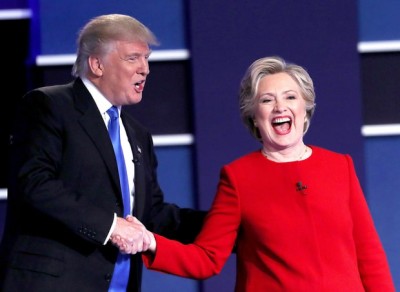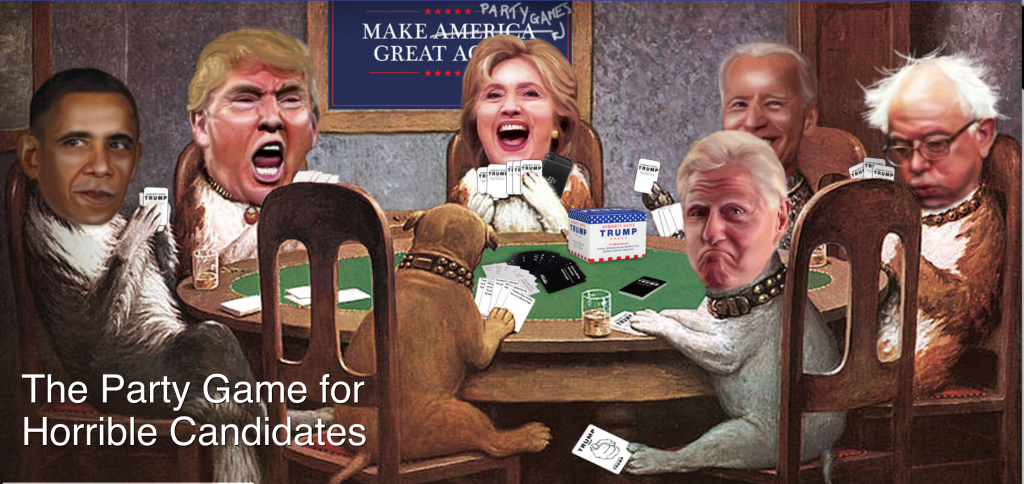Trump, Clinton: “The Two Most Disliked Candidates in U.S. History”: The Second Presidential Debate, A Political “Telenovela” In Real Time

The two most disliked candidates in modern U.S. election history did not disappoint U.S. voters’ low expectations of their performance in the second presidential debate held October 9 in St. Louis.
Both candidates spent most of their time attacking each other as either ‘morally unfit’ to be president, chronically prone to ‘bad judgement’, and habitual liars. Issues of real importance to voters were again, as in the first debate, altogether absent or, at best, were briefly and superficially addressed.
The continued mudslinging was fueled by the release of videos this past week, taken a decade or more ago, showing Trump bragging about his ability to sexually dominate women and making other generally extreme misogynist comments.
The videos set off a firestorm among the Republican elite over the week. Some began calling for Trump to drop from the race. Others talked of ‘pulling the plug’ on Republican Party financial assistance to Trump’s campaign. How Trump performed in this second debate would no doubt determine whether such talk translated into action, as the Republican camp showed signs of splitting down the middle even further and the party’s elite abandoning their candidate.
This potential ‘hard split’ among Republicans in the United States, the party elite vs. a majority of its members, is not unlike similar party developments in Europe, where the British Labour party elites have been attacking their public leader, Jeremy Corbyn, for abandoning their neoliberal policy regime; or in Spain where the Socialist Party leader was recently dumped; or in France where presidential Hollande will soon be.
The economic recovery since 2009 that has benefited only the economic elites—in the United States 95 percent of all the net income gains since 2009 have accrued to the wealthiest 1 percent households—has been translating into a grass roots disaffection from political parties. As one of the press commentators put it after the second U.S. debate, “This election is about the American people vs. the Political Class.” But it’s not just an American phenomenon. The trend is becoming generalized across many of the advanced economies.
Trump fielded the damning video evidence of his misogynist bragging by saying it was only ‘locker room’ talk. Only words. He then went on the offensive against Hillary Clinton, saying that while his were only ‘words’, Hillary’s husband, past president Bill Clinton, engaged in actual sexual abuse and was impeached for it. The Trump camp had brought three women to the debate who were involved in Bill Clinton’s impeachment charges or were subjects of Clinton’s sexual misconduct. Trump further accused Hillary of laughing when, as a prosecuting attorney, she got her client saved from jail time in a rape case involving a 12 year old. Both candidates thus showed they would go to whatever lengths to dredge up decades old evidence to prove their opponent as ‘morally unfit’.
An interesting, related detail to the ‘morality telenovela in real time’ that has become the U.S. presidential election, is that the videos of Trump were released more or less simultaneous with the Wikileaks’ release last week showing Clinton’s plans to run her campaign with one set of proposals and promises communicated to private big banker-corporate donors, while planning to say the opposite to voters. When challenged by Trump to explain the leak and her implied ‘two-faced’ approach to U.S. voters, Hillary hid behind the example of Abraham Lincoln, saying he did the same and the practice was therefore legitimate.
This ascerbic exchange was preceded by Hillary’s reference to Russia and its president, Vladimir Putin, accusing them of hacking the Democratic Party and the U.S. election in order to aid Trump. The U.S. media in recent weeks has picked up this idea, for which there is no evidence to date, and has been promoting it widely. It is yet another dimension of the growing shift in U.S. elite toward confronting Russia. Hillary’s implicit suggestion in the debate was the Wikileaks release reflects Putin-Russian interference in the US election to aid Trump. The timing of the release of the Trump videos and the Wikileaks material raises the question whether in coming weeks voters can expect more of the same—i.e. more damaging Trump videos being released, perhaps not coincidentally, as more promised Wikileaks releases appear damning Clinton.
The second debate revealed yet another, even more ominous anti-Russia theme worth noting. In a reply to a question about what would the candidates do about Syria and Aleppo, Hillary declared the Russian air force in Syria is determined to destroy Aleppo. Russia has ‘gone all in’ in terms of ambition and aggressiveness in Syria, she added. Russia’s war crimes should therefore be investigated. Furthermore, a ‘no fly zone’ should be imposed in Syria. What she didn’t explain is if Russian planes ignored the U.S. ‘no fly zone’, would the United States try to shoot them down? And what if U.S. planes were shot down, as Russians retaliated? Clinton’s exchange revealed the U.S. ‘war hawk’ faction’s increasingly desperation concerning the Syria conflict, in which the United States has been increasingly sidelined and Russia has become more influential.
The debate moderator, Martha Radditz, then asked Trump what he would do in Syria, since Trump’s vice-presidential running mate, Pence, had just days before declared, agreeing with Clinton, “the U.S. should be prepared to strike military targets of the Assad regime”, presumably including airfields with Russian planes. Trump replied “I disagree”, and that the focus should be on dealing with ISIS. Trump’s disassociating from his VP, Hillary, and the war hawk faction created some stir and commentary in the post-debate discussion by pundits and talking heads.
Another notable exchange during the debate occurred when Trump attacked Clinton for deleting her emails after receiving a subpoena, when Secretary of State. He then dropped yet another debate bombshell by saying when he’s president he would appoint a special prosecutor to investigate Hillary’s action. When she rejected the notion as an example of Trump’s ‘imperial presidency’ view, Trump retorted it didn’t matter “because you’ll be in jail”.
Hillary clearly scored points in the debate, however, when the discussion turned, on occasion briefly, to actual policy. Trump noted costs of Obamacare had risen 68 percent, and that voters were drowning under rising costs of premiums, deductibles and copays. He advocated repeal and a total restart. Clinton, however, argued to fix it, and keep the good elements, whereas Trump would return health care to insurance and pharmaceutical companies’ price gouging and coverage denial, as in the past.
Clinton scored points in the exchange on taxes as well, noting that Trump’s plan to reduce taxes from 35 percent to 15 percent would benefit the rich twice as much as had George W. Bush’s tax cuts. She proposed no tax hikes on anyone earning less than US$250,000 a year, with taxation raised only on the wealthy.
The second presidential debate changed little in terms of voter preference, according to post debate polls.
The unfavorability ratings for both candidates were virtually unchanged: Clinton with 45 percent unfavorable rating before the debate and 44 percent after; Trump with 64 percent unfavorable both before and after. In national polls Clinton enjoyed a wide margin of support among women before the debate, which has grown further after events of the past week. This margin may prove significant in the election outcome, providing it carries over to the 8 or 9 swing states where the election will be determined by voter turnout–perhaps even before November since 30 percent vote by mail before and that voting has already begun.
In the second debate, Trump’s strategy was clearly to shore up his conservative base by returning to the extreme anti-Hillary rhetoric that got him the nomination. Themes of Clinton as ‘liar’, ‘devil’, and ‘put her in jail’, were resurrected. He may have restored his base after the events of the past week, and by performing relatively better in the second debate (a very low bar), but that may not prove sufficient to win in November. Clinton has used the events of the past week and the debate to deepen her support among women voters. However, an expected ‘knock out’ debate, where Trump was decisively defeated, did not happen.
But debates and national polls are almost irrelevant at this stage. The outcome will be determined in the eight to nine swing states. With 87 percent of voters decided and neither candidate able to ‘move the needle’ in debates, it’s about whether Trump turns out more of his base in the swings states and whether Hillary can change the minds of millennials, Latinos, and others to turn out to support her after they have felt betrayed by Obama’s second term and its failure to deliver on promises made in 2012.
In the meantime, audiences can just ‘enjoy’ (and weep) the morality telenovela that is the current U.S. presidential election.
Jack Rasmus is the author of the just-released book, “Looting Greece: A New Financial Imperialism Emerges,” and the previous, “Systemic Fragility in the Global Economy.”, both published by Clarity Press, 2016. He blogs at jackrasmus.com.


